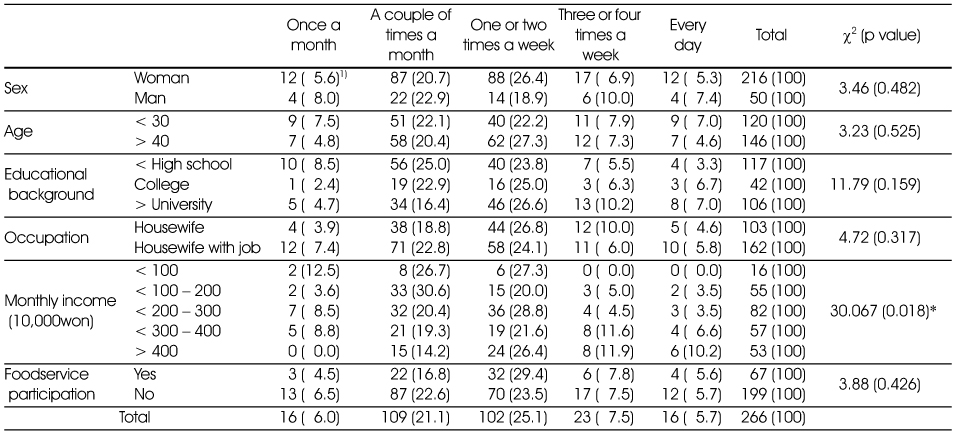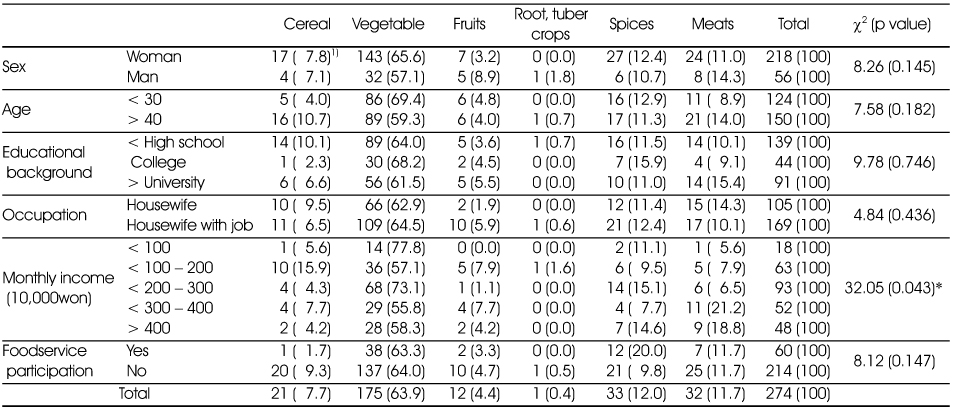Articles
- Page Path
- HOME > Korean J Community Nutr > Volume 16(1); 2011 > Article
-
Original Article
- Satisfaction and Recognition Level of Environment-Friendly Agricultural Products in Cheongju Area
- Na-Ra Kim, Young-Sun Cho, Seong-Ai Kim
-
Korean Journal of Community Nutrition 2011;16(1):75-85.
DOI: https://doi.org/10.5720/kjcn.2011.16.1.75
Published online: February 28, 2011
Nutrition Education, Graduate School of Education, Chungnam National University, Daejeon, Korea.
1Department of Food and Nutrition, Chungnam National University, Daejeon, Korea.
- Corresponding author: Seong-Ai Kim, Department of Food & Nutrition, Chungnam National University, 220 Gung-dong, Yuseong-gu, Daejeon 305-764, Korea. Tel: (042) 821-6836, Fax: (042) 821-8887, sakim@cnu.ac.kr
Copyright © 2011 The Korean Society of Community Nutrition
- 1,296 Views
- 1 Download
- 16 Crossref
Abstract
- The purpose of this study was to investigate basic data on the degree of parents' recognition and satisfaction with the use of environment-friendly agricultural products. The conclusions of this study are as follows. The survey on the use of environment-friendly products in households showed that 68.7% of the respondents used environment-friendly products at home. The frequency of purchasing organic products by household consumers showed that 25.1% of the respondents bought organic products one to two times per week. The most popular items of the environment-friendly agricultural products used were vegetables, comprising 63.9%. The households with more than 3,000,000 won of monthly income tended to consume more domestic livestock products (p < 0.05). In comparison to general agricultural products, environment-friendly agricultural products users showed higher satisfaction level with a better quality in term of safety, quality, nutrition, taste, appearance, diversity and price. The degree of satisfaction with safety was the highest (3.8 ± 0.68), and price showed the lowest (2.76 ± 0.79). The degree of parents' recognition of the governmental support for environment-friendly agricultural products showed that those who were aware of the supporting policy were 44.5%, but 55.5% of them didn't know about the fact that 46.6% of the respondents agreed that environment-friendly agricultural products should be used in more than 50% of the foods used for school food service. The respondents pointed out that vegetables (45%) sprayed with pesticide are the most urgent food item that need to be replaced by environment-friendly farm products.
- 1. Ahn PR. An analysis on the characteristics of purchasing behavior for environment-friendly agri-products on consumers in Gwangju. Korean J Org Agric. 2005; 13(3): 229-242.
- 2. Chang HS, Lee MJ. The Perception for Management of School Foodservice Using of Environmentally Friendly Agricultural Products of Elementary School Children's Mothers in Gunsan. Korean J Community Nutr. 2008; 13(6): 867-878.
- 3. Choi HS. The utilization and perception on environment friendly agricultural products of the college students. 2007; Inha University; MS thesis.
- 4. Choi JW. Degree of satisfaction and recognition for environment friendiy agricultural products of elementary school teachers and students in Iksan. 2007; Wonkwang University; MS thesis.
- 5. Choi MK, Seo HC, Baek SH. The influence of environment-friendly agricultural products(EAPs) perception of parents in Cuung-buk area on EAPs consumption behavior. Korean J Food Nutr. 2010; 23(2): 269-275.
- 6. Chyun JH, Choe EO, Hong SY, Woo KJ, Kim YA. A study on food service administration and nutrition education in elementary schools in Inchon. Korean J Food Cult. 1999; 14(4): 417-429.
- 7. Han KS, Hong SH. A study of the operation of contract foodservice management and menu preference of middle school students in Seoul. Korean J Community Nutr. 2002; 7(4): 559-570.
- 8. Jang SM. A survey of school nutritionists' use and satisfaction of environment-friendly farm products-focused on Seoul and Gyeonggido. 2007; Suwon University; MS thesis.
- 9. Kim BM, Song KH. A study on production and demand expansion for environmental-friengly farming products - in Kwangju and Jeonnam province. Korean J Org Agric. 2004; 12(3): 265-278.
- 10. Kim YS, Han YS. A study on the utilization present status and the satisfaction with environment-friendly agricultural products. Porceeding of 2006 Spring Science Meeting of the Korean Food & Cookery Science. 2005; 145.
- 11. Kim SO, Kim MH, Shim JH. Understanding of consumers' perception on environment-friendly agricultual products (EAP) and purchasing behaviors by comparing purchasers and nonpurchasers. Korean J Org Agric. 2008; 16(1): 21-42.
- 12. Kim KS. Fators influencing purchasing-status of environmentfriendly agricultural products at school food service in Gyenonggido. 2008; department of nutrition education graduate school of education Hanyang University; MS thesis.
- 13. Ko BS, Ko PS. The study on the characteristics of circulation of environment friendly agricultural products and the consumers' purchase intention. Korean J Culinary Res. 2005; 11(4): 214-227.
- 14. Korea Law. 2009; Available from http://www.law.go.kr.
- 15. Lee JY. Analysis of consumer's behavior on the environmentally-friendly agricultural products- with special reference to consumer in Daejeon city-. 2005; Chungnam National University; MS thesis.
- 16. Lee KA. Evaluation of nutritional management in elementary school lunch program. Korean J Nutr. 1998; 31(2): 192-205.
- 17. Lee MS, Park YS, Lee JW. Comparisons of children and their parents' satisfaction of school lunch program in elementary school by foodservice system. Korean J Nutr. 1998; 31(2): 179-191.
- 18. Lee YE. An analysis on the satisfaction with the quality of school foodservice in Chungbuk province. Korean J Food Cult. 2008; 23(1): 105-114.
- 19. Lee YS, Park MJ. Parental perception and satisfaction with environment-friendly agricultual products used for school foodservice in elementary schools in Daejeon. Korean J Food Cult. 2008; 23(6): 737-747.
- 20. Lee MJ. A study on the utilization and the satisfaction of environment-friendly agricultural products among female residents in Gwangju, Jeonnam area. 2009; major in nutrition education graduate school of education Dongshin University; MS thesis.
- 21. Ministry of Education, Science and Technology. 2009; Available from http://www.mest.go.kr/newsearch/search.jsp.
- 22. Oh HY, Heo SW. An analysis on willingness to pay for environmental-friengly agr-product food service of child-care centers. Korean J Org Agric. 2005; 13(4): 375-388.
- 23. Park EJ. A study on housewives' awareness and consumption pattern of environmentally friendly agricultural products. 2008; the graduate school of education Korea University; MS thesis.
- 24. Park JY. A study on use status of and satisfaction with environmental-friendly agricultural products by female consumers in Jeju area - focused on consumers using specialty shops for environmental-friendly agricultural products. 2006; Department of home education graduate school of education Jeju National University; MS thesis.
- 25. Ryu MJ. Nutritional management and a foodstuff use for elementary schools in Busan area. 2003; Kosin University; MS thesis.
- 26. Ryu MJ, Suh JS, Lyu ES. A perception of dietitians for using imported foods and pro-environment farm products for elementary school foodservice operations in Busan. J Korean Diet Assoc. 2004; 10(4): 452-466.
- 27. Seo JW. Increasing consumption of environmental friendly agricultural products-the focus on school lunch program-. 2006; Chonnam National University; Dissertation.
- 28. Sin CR. A study on consumers' purchasing pattern for environmental-friendly agricultural products-focused on the Changwon, Jinju, Sacheon area-. 2006; Gyeondsang National University; MS thesis.
- 29. The Ministry for Food, Agriculture, Forestry and Fisheries. 2009; Available from http://www.mifaff.go.kr/gonews/search.jsp.
- 30. Yang IS, Lee BS, Lee SJ, Lee HY, Jung HY. Using status of Korean agricultural products in school food service and dieticians' perceptions. Korean J Food Cult. 2006; 21(2): 142-153.
REFERENCES
Figure & Data
REFERENCES
Citations

- An Integrated Assessment of Different Types of Environment-Friendly Technological Progress and Their Spatial Spillover Effects in the Chinese Agriculture Sector
Guang Chen, Yue Deng, Apurbo Sarkar, Zhengbing Wang
Agriculture.2022; 12(7): 1043. CrossRef - Recognition of Environmentally-friendly Agricultural Products for School Foodservice of Nutrition Teachers and Parents in 2018 at Seongnam in Gyeonggi province
Jisoo Kwon, Wookyoun Cho
Korean Journal of Community Nutrition.2019; 24(4): 290. CrossRef - Factors Influencing the Purchase Intention of Environment-Friendly Agricultural Products for Mothers with Elementary School Children
Xiang Li, Dong-Yean Park
The Korean Journal of Community Living Science.2018; 29(1): 97. CrossRef - Perception of Use of Environment-friendly Agricultural Products during School Foodservice of Mothers of Elementary School Students in Gyeonggi
Young-Un An, Myung-Hee Kim, Mi-Kyeong Choi, Mi-Hyun Kim
Korean Journal of Community Nutrition.2018; 23(3): 234. CrossRef - Parents' Perception and Satisfaction of School Food Materials and Supplier -Performance in Mokpo, Korea-
Seok-In Lee, Pyong-Yon Kang, Hyun-Young Jung
Journal of the Korean Society of Food Science and Nutrition.2015; 44(11): 1741. CrossRef - A survey of eco-foodservice perception and satisfaction of elementary school parents in Jeju
Mi-Hui Jeong, In-Sook Chae
Journal of Nutrition and Health.2015; 48(1): 105. CrossRef - Perception and Purchase Behavior on Environment-friendly Agricultural Products of College Students in Daejeon
Yu-Jin Cho, Nan-Sook Koo
Korean journal of food and cookery science.2015; 31(3): 328. CrossRef - Perception of environment-friendly foods and satisfaction with school meals among students, their parents, and nutrition teachers at elementary schools in the Jindo area, Jeonnam
Moon-Hee Jung, Moon-Jeong Chang, Sun-Hee Kim
Journal of Nutrition and Health.2013; 46(4): 369. CrossRef - A Survey on the Use and Perception of Environmentally-friendly Organic Materials among Korean Farmers
Min-Kyoung Paik, Sung-Eun Park, Bong-Hoe Kim, Yong-Ki Kim, Jin-Ah Oh, Doo-Ho Kim, Je-Bong Lee
The Korean Journal of Pesticide Science.2013; 17(1): 41. CrossRef - Middle School Students' Perception of Environment-friendly Agricultural Products (EAPs) and the Degree of Confidence about the Certification Mark in Daegu
Ji-Yeon Jang, Mi-Kyung Choi
Korean Journal of Community Nutrition.2013; 18(4): 324. CrossRef - Processing Factor of Matrine in Chilli Pepper
Hyun Ho Noh, Jae Yun Lee, Jin Chan Kim, Oh Seok Jeong, Hye Sung Kim, Yong Hun Lee, Ji Hee Choi, Ae Son Om, Su Myeong Hong, Min Kyoung Paik, Doo Ho Kim, Kee Sung Kyung
The Korean Journal of Pesticide Science.2013; 17(4): 244. CrossRef - Actual Status of School Dietitians' Recognition and Use of Superior Agricultural Products in Daegu
Jin A Jang, Sun Woo Ahn, Mi-Kyung Choi
Korean Journal of Community Nutrition.2012; 17(3): 312. CrossRef - A Survey of Purchasing Management for School Foodservice Foods in Daegu and Gyeongbuk Province
Yun-Hwa Kim, Yeon-Kyung Lee
Korean Journal of Food Preservation.2012; 19(3): 376. CrossRef - Parents' perception on middle school foodservice using environment friendly agricultural products (EFAP) in Masan area
Yoon-Soon Nam, Hyun-Ah Kim
Korean Journal of Nutrition.2012; 45(2): 181. CrossRef - A Survey of Receiving Management of School Foodservice in Daegu and Gyeongbuk Province
Yun-Hwa Kim, Yeon-Kyung Lee
Korean Journal of Food Preservation.2012; 19(4): 611. CrossRef - The Housewives' Purchase Behaviors on Environment-friendly Agricultural Products in Daejeon Area
In-Jung Kim, Joon-Ho Lee
Korean Journal of Community Nutrition.2011; 16(3): 386. CrossRef
General characteristics of the subjects
The present status of using environment-friendly agricultural products in house
1) N (%), *: p < 0.05, **: p < 0.01, ***: p < 0.001
Frequency of purchasing environment-friendly agricultural products in house
1) N (%), *: p < 0.05
Kinds of frequently purchasing environment-friendly agricultural products
1) N (%), *: p < 0.05
Satisfaction of environment-friendly agricultural products
1) Mean ± SD, *: p < 0.05, **: p < 0.01, ***: p < 0.001
2) The alphabets mean the significant differences by Duncan's multiple range comparison : a < b < c < d
Recognition level of supporting business for environment-friendly agricultural products
1) N (%), *: p < 0.05
The percentage of using environment-friendly agricultural products in school foodservice
1) N (%), *: p < 0.05
Food urgently needed to be replaced with environment-friendly agricultural products in school foodservice
1) N (%), *: p < 0.05
The degree of additional meal expenses beneficiaries should pay
1) N (%), *: p < 0.05
1) N (%), *: p < 0.05, **: p < 0.01, ***: p < 0.001
1) N (%), *: p < 0.05
1) N (%), *: p < 0.05
1) Mean ± SD, *: p < 0.05, **: p < 0.01, ***: p < 0.001 2) The alphabets mean the significant differences by Duncan's multiple range comparison : a < b < c < d
1) N (%), *: p < 0.05
1) N (%), *: p < 0.05
1) N (%), *: p < 0.05
1) N (%), *: p < 0.05

 KSCN
KSCN









 Cite
Cite


